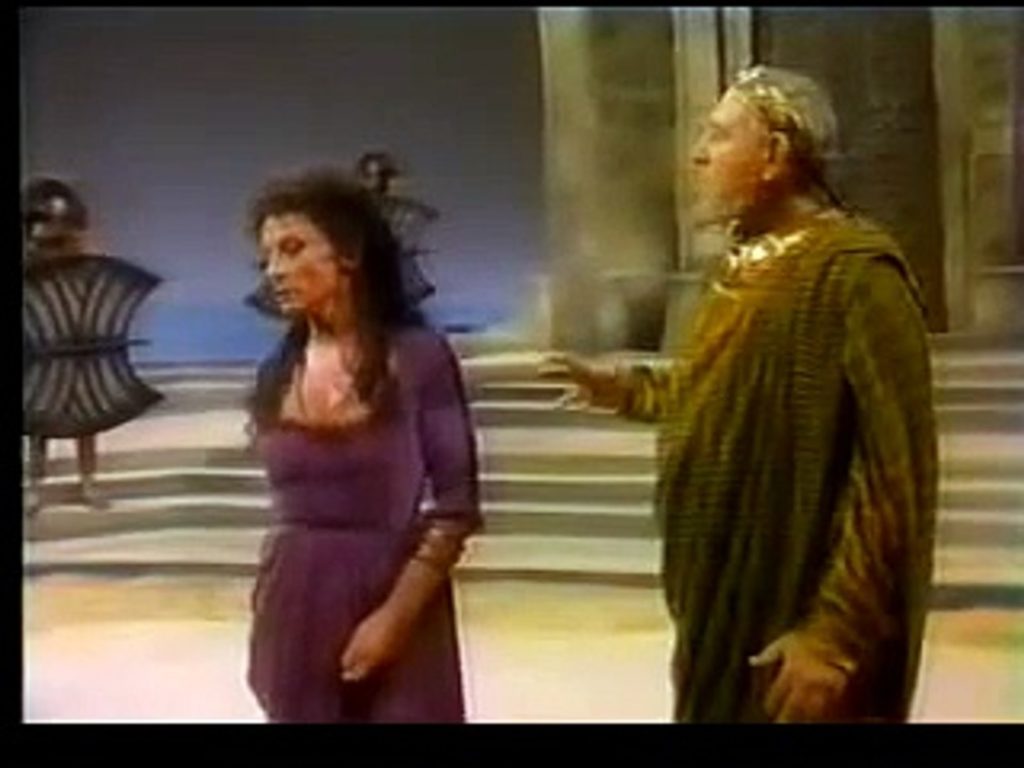Zoe Caldwell, Who Played Medea and Callas, Has Died
By • February 20, 2020 0 1873

Zoe Caldwell, who died on Feb. 16 at her home in Pound Ridge, New York, aged 86, of complications from Parkinson’s disease, surprisingly isn’t that hard to find on the internet.
There is a short scene from the 1983 production of Euripides’ scathing tragedy “Medea” on YouTube, in which a furious but also wary Paul Sparer as King Creon confronts Caldwell, noting that “men say that you could bring down the moon from heaven,” but also calling her “dangerous,” “serpentine,” “a wolf from Asia.”
The scene is close up, brightly lit, sharply framed, Caldwell’s murderous Medea raging out front like a map to the worst thing and place, her face seductive but barely containing fury.
In some ways, seen this way, the scene and Caldwell form a kind of prison, as well as a prism. Seen from a middle seat, the scene expands into fullness, becoming the reason you go to the theater, to see and hear characters, actors and scenes uniquely suited to the stage.
This is especially true for the Greek tragedies, with protagonists like Medea, who embodies revenge, sex, madness and the cold-hot logic of consequences and execution, including the murder of children.
We saw Caldwell play — savagely and seductively — at the Kennedy Center, wreaking havoc on the stage, avenging herself on her husband Jason, father of her children and the star Argonaut, for marrying Creon’s daughter.
Caldwell was one of those actresses uniquely suited for the stage, the kind of actress that could overpower a part and disappear in it, leaving familiar personality and style by the side of the road.
This “Medea” seemed uniquely theatrical in terms of theater lore and history. Sharing the stage with Caldwell was Judith Anderson, playing the nurse to Medea’s children. In 1947, Anderson had played the title role, and watching this unravel you had to wonder what memories where roiling with Anderson, who was never unafraid onstage, having attempted to play “Hamlet” late in her career.
Anderson, Caldwell and, later, Diana Rigg played Medea and won Tony Awards for their performances. Of the three, Rigg probably is (weirdly) the best known, for her sexy and smart role in the British television spy show “The Avengers.”
Caldwell had the occasional movie and television role — a memorable one in Woody Allen’s “The Purple Rose of Cairo” — but it’s her state and status as a stage actress and her monumental reputation that goes with it that made her who she was.
Australian by birth, she got hooked into theater when her mother took neighborhood kids in Melbourne backstage at the Elizabethan theater in Richmond. She began acting in Melbourne in the 1950s and 1960s with the Union Theatre Repertory Company, moved to England and was invited to join the Royal Shakespeare Company — when it was peopled by the likes of Charles Laughton, Vanessa Redgrave and Eileen Atkins. She played opposite Paul Robeson and Albert Finney in “Othello,” then moved to Tyrone Guthrie’s theater in Minneapolis.
She married Broadway producer Robert Whitehead in 1968. They were married at the time of his death in June of 2002.
In all, Caldwell won four Tonys, which seemed a reflection of who she was onstage and the kind of actress she was. She won a best featured actress award for “Slapstick Tragedy” by Tennessee Williams, “The Prime of Miss Jean Brodie,” “Medea” and Terence McNally’s “Master Class.”
“Master Class” saw Caldwell play a voice-failing Maria Callas, teaching a master class to a budding opera star, a play that came to the Kennedy Center. She also did a one-woman play about the irascible critic, writer, politico and one-man band Lillian Hellman.
We had the good fortune to see Caldwell in “Medea,” in “Master Class” and playing Hellman. Among the Greeks, with a younger star or all alone, Caldwell was a phoenix, with the difficult task of disappearing into the role and making it sublime.
We’ve seen actors like that — unique nonetheless — who bridged the distance between play, role and audience in a theater, and became full-bodied in the way that close-ups never do. Think of Estelle Parsons, Geraldine Page, Olivier before he learned to act for a camera, Sandy Dennis, Elizabeth Ashley, Anderson, Derek Jacoby and, locally, the wonderful Nancy Robinette. They disappear and reemerge grand and real.
Reading about her death, I keep writing in the present tense. Her “Medea” stuck in my mind, remains there now. It felt, at the time, like a gift — or a punch in the mouth.
Her record shows she played Sarah Bernhardt at one point. But, of course.

